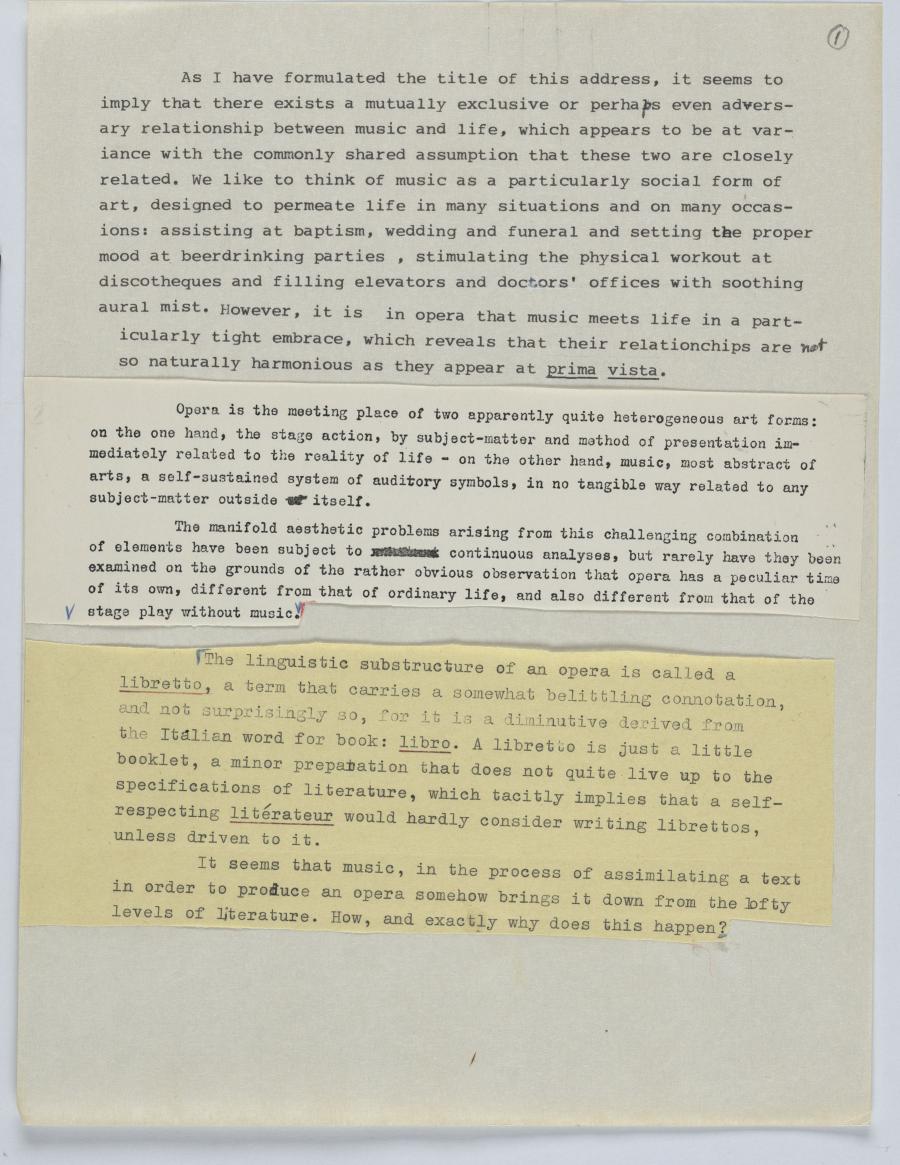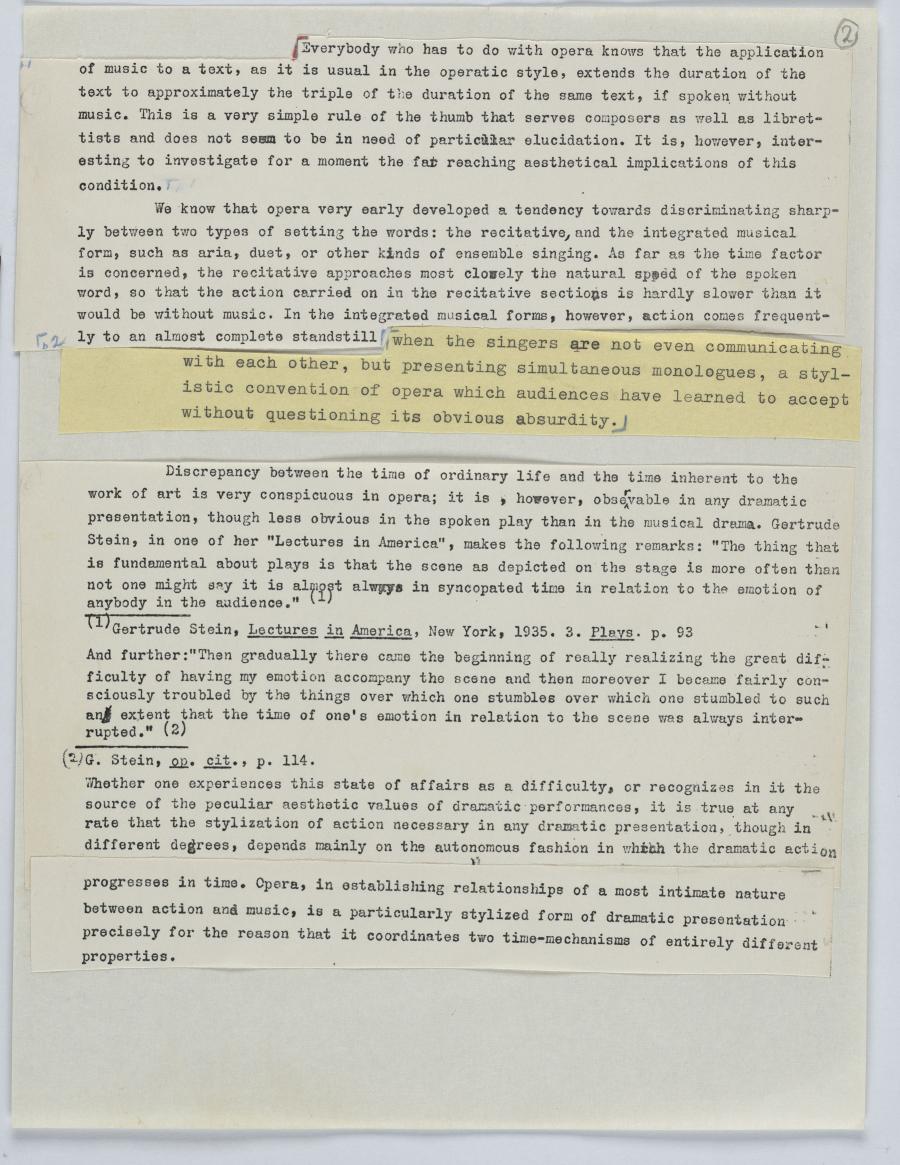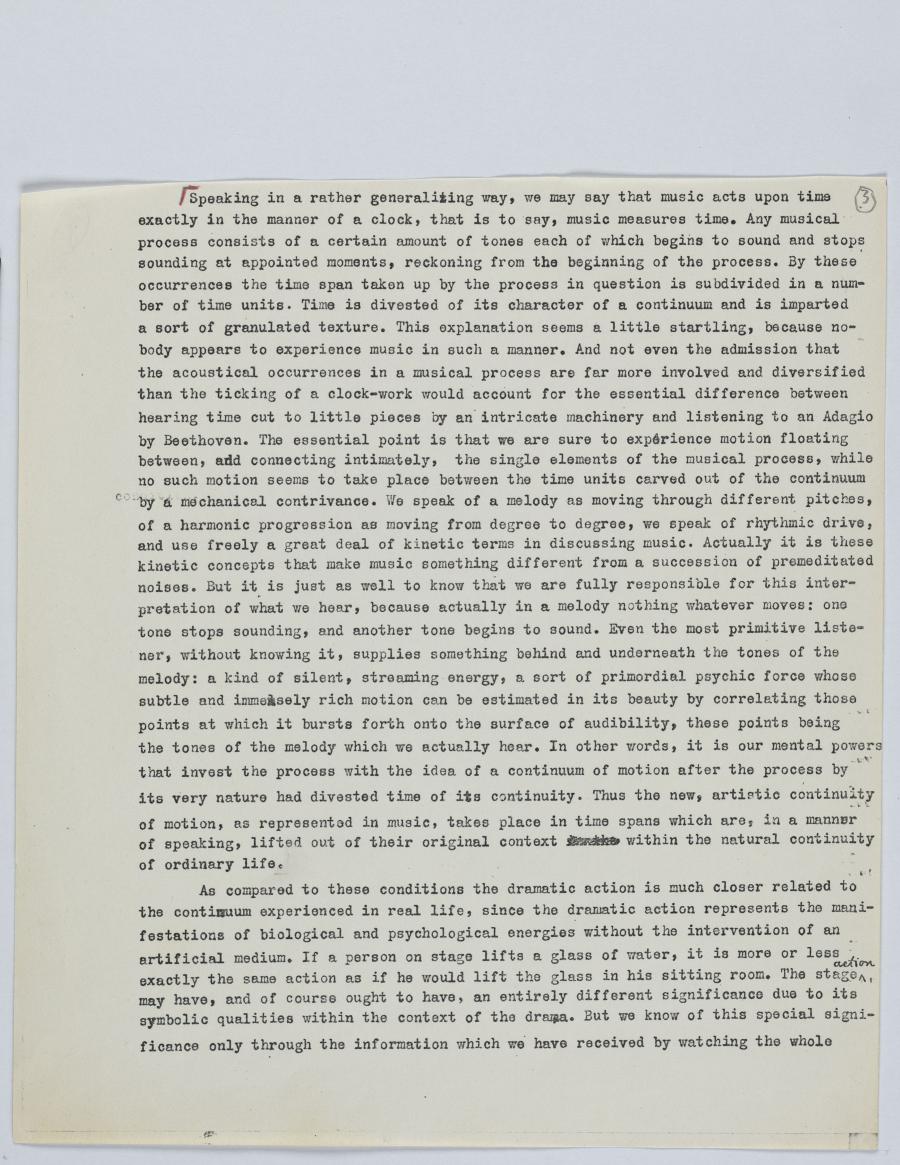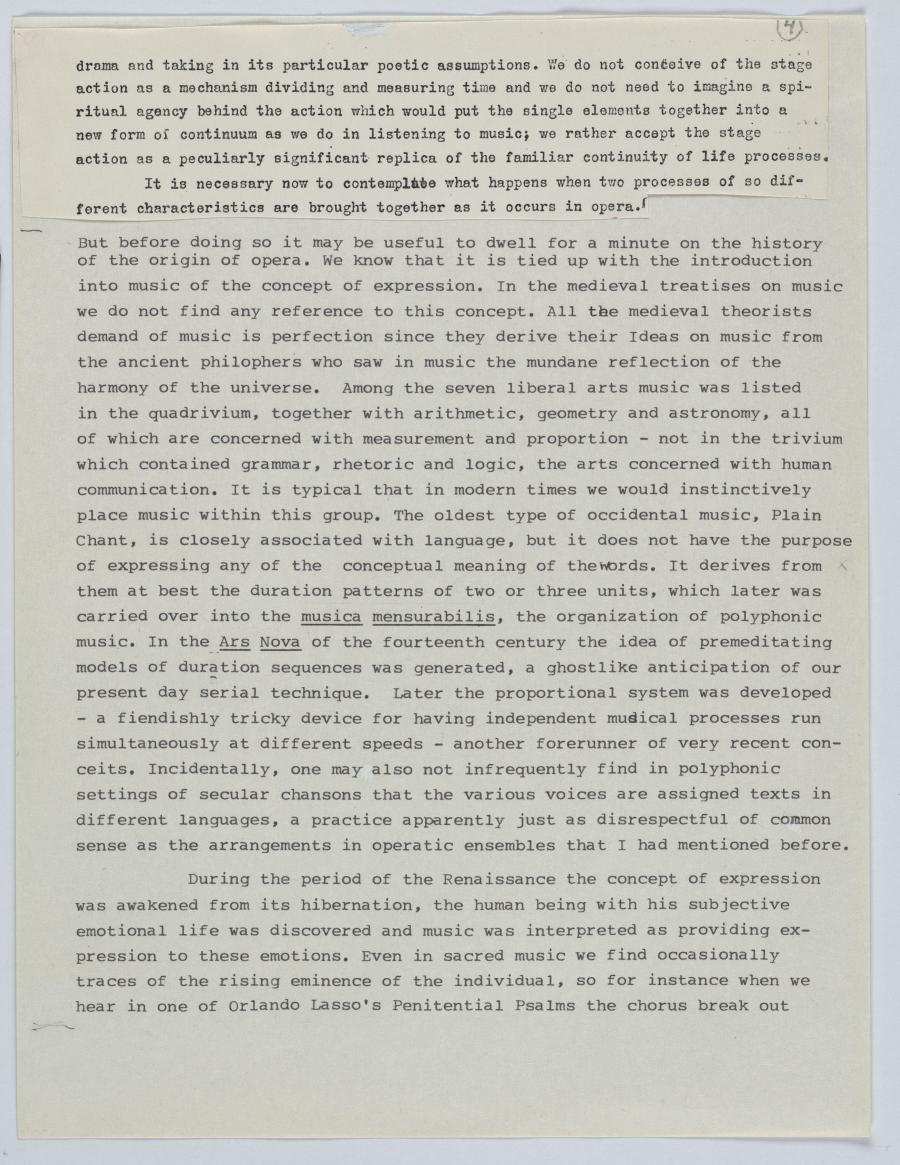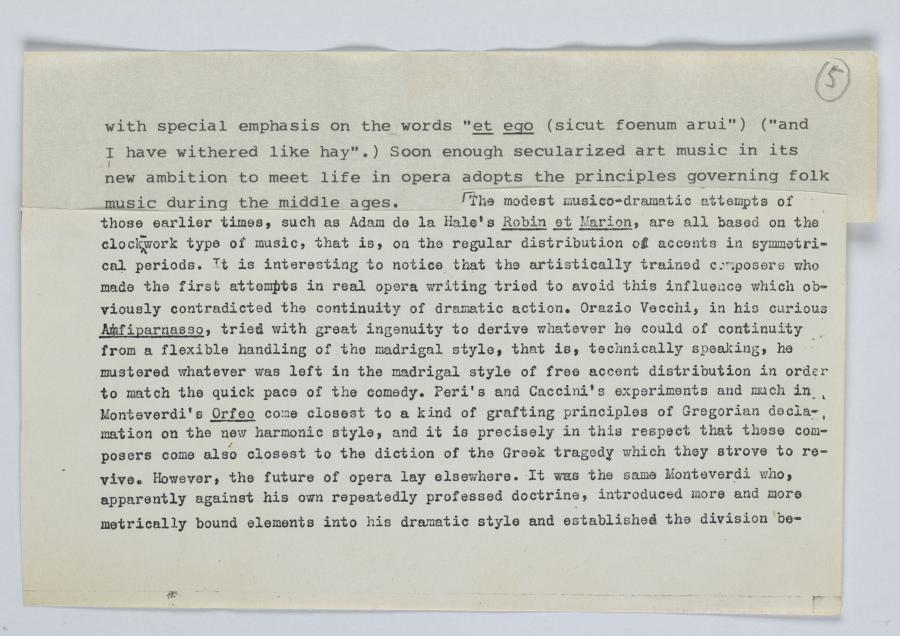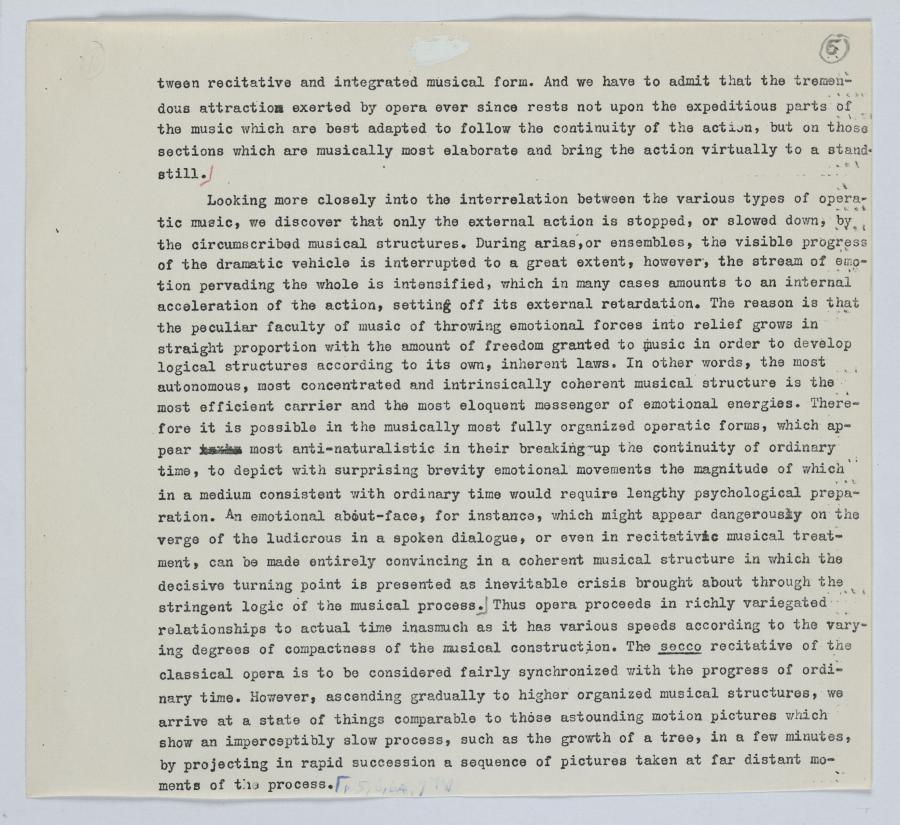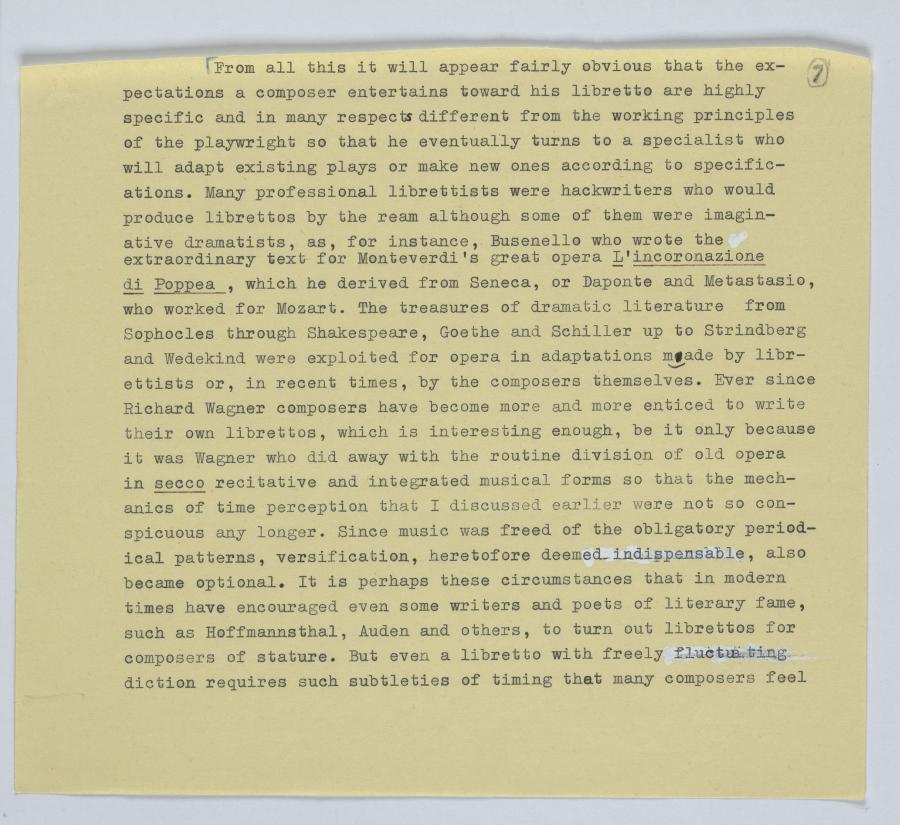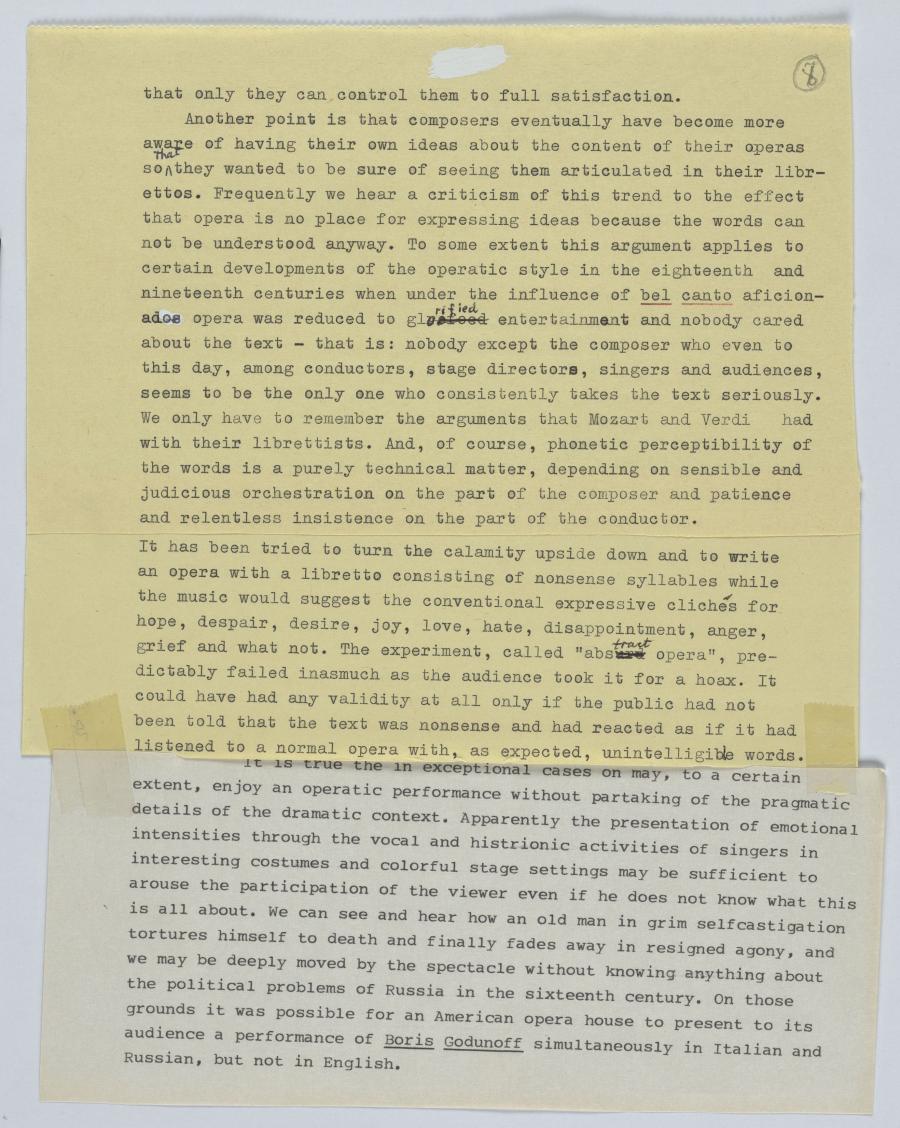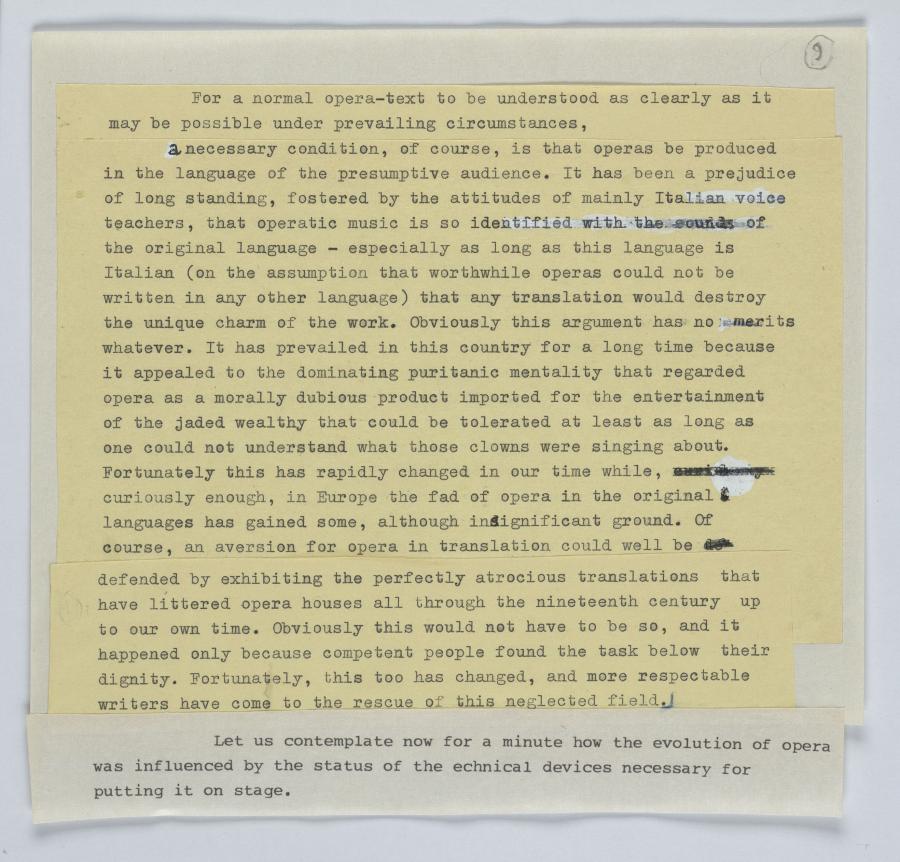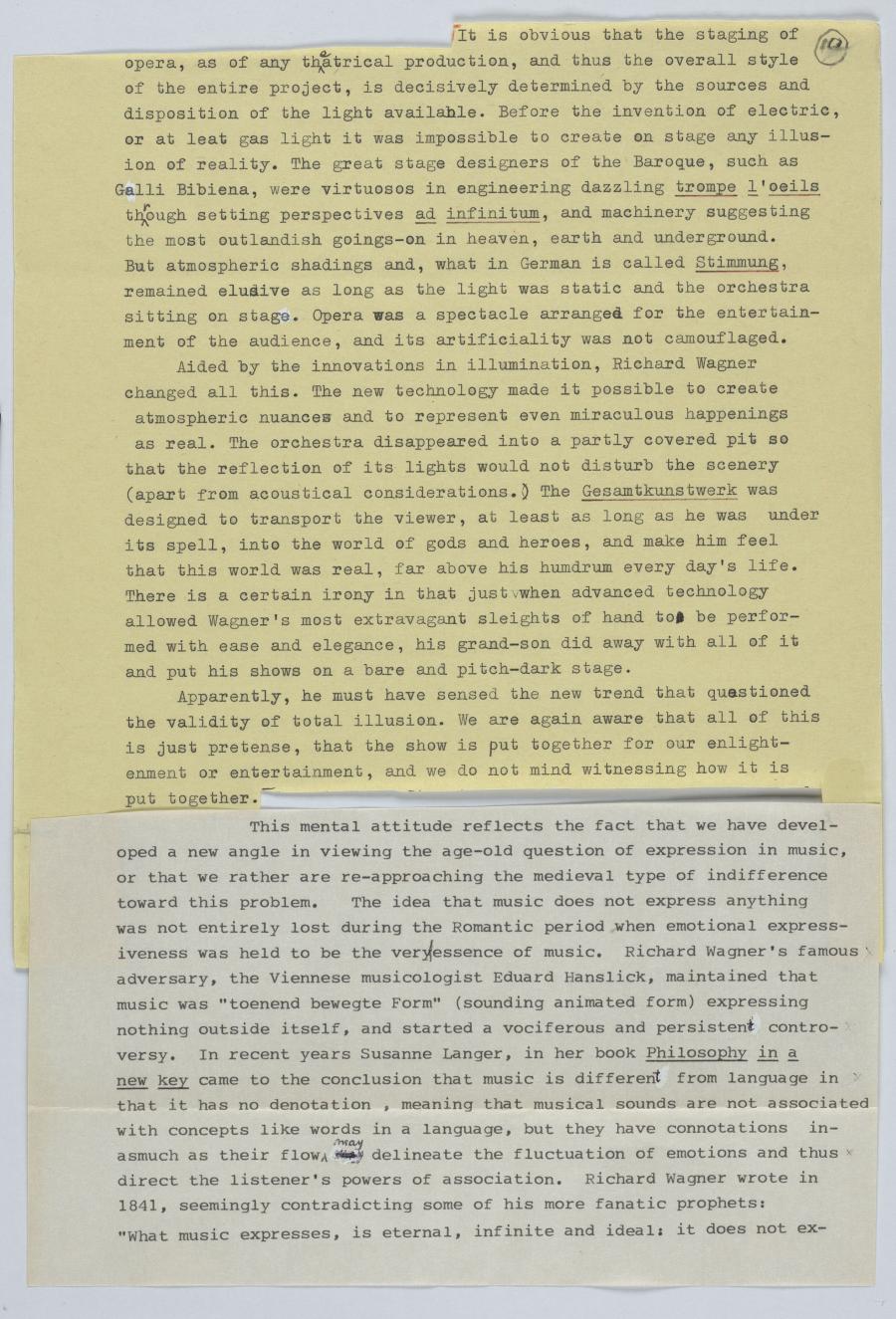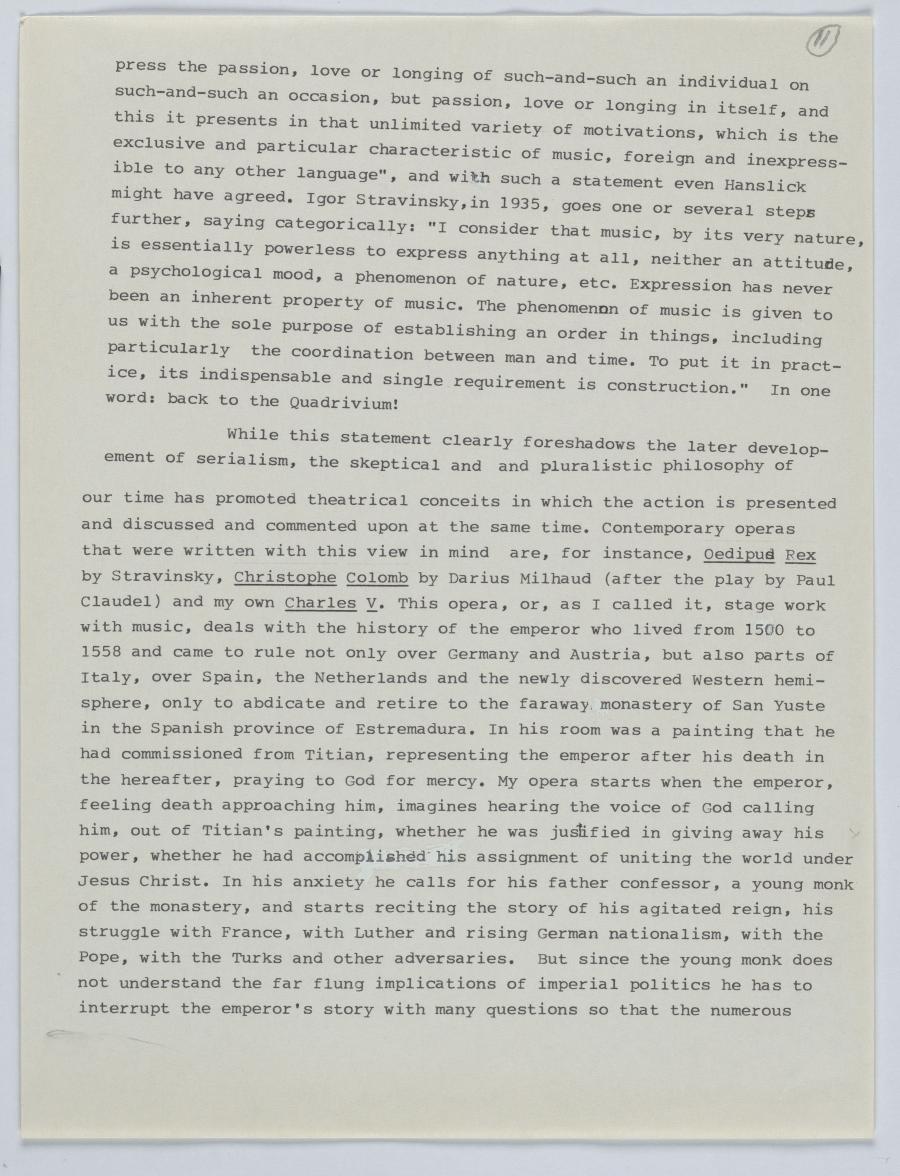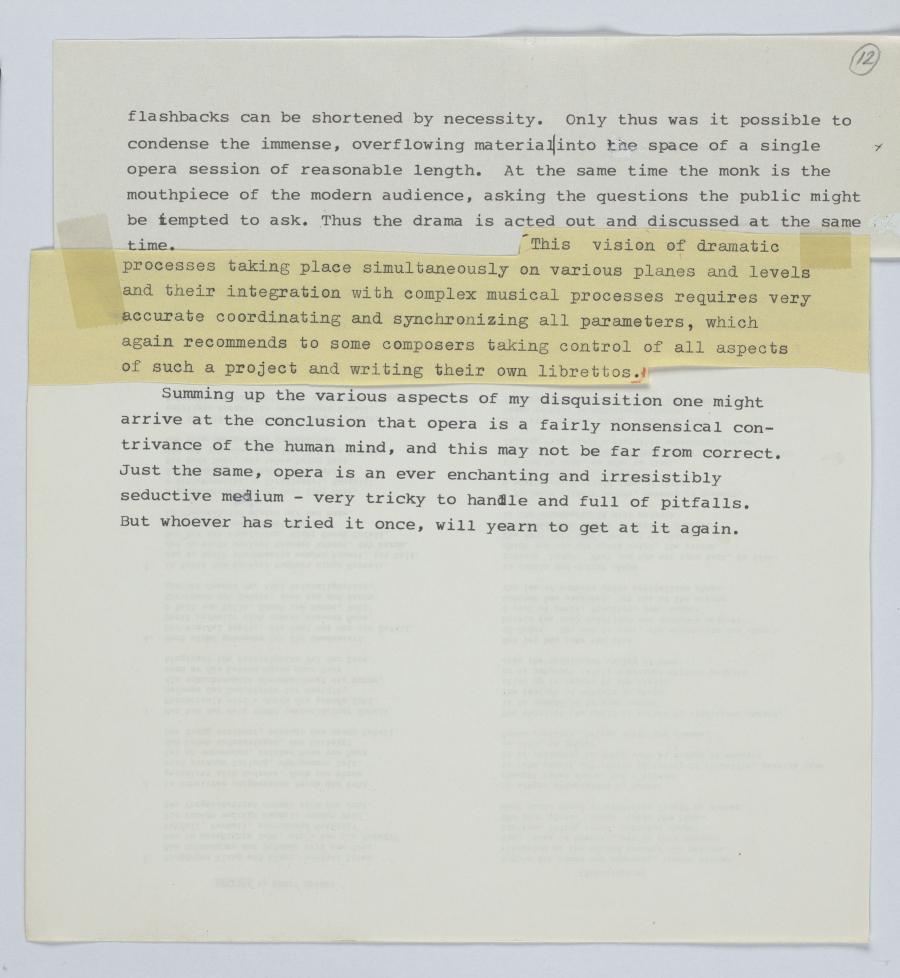[Überarbeiteter Vortrag zu Musik und Text in der Oper]
Abstract
Diesen Vortrag mit dem Titel „Music Meets Life in Opera“ präsentierte Ernst Krenek am 29. März 1984 beim Composer’s Symposium an der University of New Mexico. In einer Baustein-artigen Zusammensetzung verwendete Krenek dabei auch Teile eines unter dem selben Titel 1942 gehaltenen Vortrag und einem Vortrag von 1979 mit dem Titel „Music and Text – Reflections of a modern composer on Lied and libretto.
In seinem Beitrag blickt Krenek auf die historische Entwicklung der Oper, auf die Problematik der Übersetzung von Operntexten und auf die unterschiedliche musikalische Umsetzung der Texte von Monteverdi über Wagner bis zu seiner eigenen Oper Karl V.
1
As I have formulated the title of this address, it seems to
imply that there exists a mutually exclusive or perhaprima vista.
Opera is the meeting place of two apparently quite heterogeneous art forms:
on the one hand, the stage action, by subject matter and method of presentation im-
mediately related to the reality of life - on the other hand, music, most abstract of
arts, a self-sustained system of auditory symbols, in no tangible way related to any
subject-matter outside
The manifold aesthetic problems arising from this challenging combination
of elements have been subject to
The linguistic substructure of an opera is called a
libretto, a term that carries a somewhat belittling connotation,
and not surprisingly so, for it is a diminutive derived from
the Italian word for book: libro. A libretto is just a little
booklet, a minor preparation that does not quite live up to the
specifications of literature, which tacitly implies that a self-
respecting litérateur would hardly consider writing librettos,
unless driven to it.
It seems that music, in the process of assimilating a text in order to produce an opera somehow brings it down from the lofty levels of literature. How, and exactly why does this happen?
2
Everybody who has to do with opera knows that the application of music to a text, as it is usual in the operatic style, extends the duration of the text to approximately the triple of the duration of the same text, if spoken without music. This is a very simple rule of the thumb that serves composers as well as libret- tists and does not seem to be in need of particular elucidation. It is, however, inter- esting to investigate for a moment the far reaching aesthetical implications of this condition.
We know that opera very early developed a tendency towards discriminating sharp- ly between two types of setting the words: the recitative, and the integrated musical form, such as aria, duet, or other kinds of ensemble singing. As far as the time factor is concerned, the recitative approaches most closely the natural speed of the spoken word, so that the action carried on in the recitative sections is hardly slower than it would be without music. In the integrated musical forms, however, action comes frequent- ly to an almost complete standstill when the singers are not even communicating with each other, but presenting simultaneous monologues, a styl- istic convention of opera which audiences have learned to accept without questioning its obvious absurdity.
p2
Discrepancy between the time of ordinary life and the time inherent to the
work of art is very conspicuous in opera; it is, however, Lectures in America, Plays. p. 93
And further; "Then gradually there came the beginning of really realizing the great dif-
ficulty of having my emotion accompany the scene and then moreover I became fairly con-
sciously troubled by the things over which one stumbles over which one stumbled to such
top. cit., p. 114.
Whether one experiences this state of affairs as a difficulty, or recognizes in it the
source of the peculiar aesthetic values of dramatic performances, it is true at any
rate that the stylization of action necessary in any dramatic presentation, though in
different degrees, depends mainly on the autonomous fashion in which the dramatic action
progresses in time. Opera, in establishing relationships of a most intimate nature
between action and music, is a particularly stylized form of dramatic presentation
precisely for the reason that it coordinates two time-mechanisms of entirely different
properties.
3
Speaking in a rather generalizing way, we may say that music acts upon time
exactly in the manner of a clock, that is to say, music measures time. Any musical
process consists of a certain amount of tones each of which begins to sound and stops
sounding at appointed moments, reckoning from the beginning of the process. By these
occurrences the time span taken up by the process in question is subdivided in a num-
ber of time units. Time is divested of its character of a continuum and is imparted
a sort of granulated texture. This explanation seems a little startling, because no-
body appears to experience music in such a manner. And not even the admission that
the acoustical occurrences in a musical process are far more involved and diversified
than the ticking of a clock-work would account for the essential difference between
hearing time cut to little pieces by an intricate machinery and listening to an Adagio
by
As compared to these conditions the dramatic action is much closer related to
the continuum experienced in real life, since the dramatic action represents the mani-
festations of biological and psychological energies without the intervention of an
artificial medium. If a person on stage lifts a glass of water, it is more or less
exactly the same action as if he would lift the glass in his sitting room. The
4
drama and taking in its particular poetic assumptions. We do not conceive of the stage action as a mechanism dividing and measuring time and we do not need to imagine a spi- ritual agency behind the action which would put the single elements together into a new form of continuum as we do in listening to music; we rather accept the stage action as a peculiarly significant replica of the familiar continuity of life processes.
It is necessary now to contemplate what happens when two processes of so dif- ferent characteristics are brought together as it occurs in opera.
But before doing so it may be useful to dwell for a minute on the history
of the origin of opera. We know that it is tied up with the introduction
into music of the concept of expression. In the medieval treatises on music
we do not find any reference to this concept. All the medieval theorists
demand of music is perfection since they derive their Ideas on music from
the ancient philophers who saw in music the mundane reflection of the
harmony of the universe. Among the seven liberal arts music was listed
in the quadrivium, together with arithmetic, geometry and astronomy, all
of which are concerned with measurement and proportion - not in the trivium
which contained grammar, rhetoric and logic, the arts concerned with human
communication. It is typical that in modern times we would instinctively
place music within this group. The oldest type of occidental music, Plain
Chant, is closely associated with language, but it does not have the purpose
of expressing any of the conceptual meaning of the words. It derives from
them at best the duration patterns of two or three units, which later was
carried over into the musica mensurabilis, the organization of polyphonic
music. In the Ars Nova of the fourteenth century the idea of premeditating
models of duration sequences was generated, a ghostlike anticipation of our
present day serial technique. Later the proportional system was developed
- a fiendishly tricky device for having independent musical processes run
simultaneously at different speeds - another forerunner of very recent con-
ceits. Incidentally, one may also not infrequently find in polyphonic
settings of secular chansons that the various voices are assigned texts in
different languages, a practice apparently just as disrespectful of common
sense as the arrangements in operatic ensembles that I had mentioned before.
During the period of the Renaissance the concept of expression
was awakened from its hibernation, the human being with his subjective
emotional life was discovered and music was interpreted as providing ex-
pression to these emotions. Even in sacred music we find occasionally
traces of the rising eminence of the individual, so for instance when we
hear in one of
5
with special emphasis on the words "et ego (sicut foenum arui") ("and
I have withered like hay".) Soon enough secularized art music in its
new ambition to meet life in opera adopts the principles governing folk
music during the middle ages.
The modest musico-dramatic attempts of
those earlier times, such as Robin et Marion Amfiparnasso, tried with great ingenuity to derive whatever he could of continuity
from a flexible handling of the madrigal style, that is, technically speaking, he
mustered whatever was left in the madrigal style of free accent distribution in order
to match the quick pace of the comedy. Peri's and Caccini's experiments and much in
come closest to a kind of grafting principles of Gregorian decla- mation on the new harmonic style, and it is precisely in this respect that these com- posers come also closest to the diction of the Greek tragedy which they strove to re- vive. However, the future of opera lay elsewhere. It was the sameOrfeo
6
tween recitative and integrated musical form. And we have to admit that the tremen- dous attraction exerted by opera ever since rests not upon the expeditious parts of the music which are best adapted to follow the continuity of the action, but on those sections which are musically most elaborate and bring the action virtually to a stand- still.
Looking more closely into the interrelation between the various types of opera-
tic music, we discover that only the external action is stopped, or slowed down, by
the circumscribed musical structures. During arias, or ensembles, the visible progress
of the dramatic vehicle is interrupted to a great extent, however, the stream of emo-
tion pervading the whole is intensified, which in many cases amounts to an internal
acceleration of the action, setting off its external retardation. The reason is that
the peculiar faculty of music of throwing emotional forces into relief grows in
straight proportion with the amount of freedom granted to music in order to develop
logical structures according to its own, inherent laws. In other words, the most
autonomous, most concentrated and intrinsically coherent musical structure is the
most efficient carrier and the most eloquent messenger of emotional energies. There-
fore it is possible in the musically most fully organized operatic forms, which ap-
pear secco recitative of the
classical opera is to be considered fairly synchronized with the progress of ordi-
nary time. However, ascending gradually to higher organized musical structures, we
arrive at a state of things comparable to those astounding motion pictures which
show an imperceptibly slow process, such as the growth of a tree, in a few minutes,
by projecting in rapid succession a sequence of pictures taken at far distant mo-
ments of the process.
7
From all this it will appear fairly obvious that the ex-
pectations a composer entertains toward his libretto are highly
specific and in many L'incoronazionedi Poppeaeadesecco recitative and integrated musical forms so that the mech-
anics of time perception that I discussed earlier were not so con-
spicuous any longer. Since music was freed of the obligatory period-
ical patterns, versification, heretofore deemed indispensable, also
became optional. It is perhaps these circumstances that in modern
times have encouraged even some writers and poets of literary fame,
such as
8
that only they can control them to full satisfaction.
Another point is that composers eventually have become more
aware of having their own ideas about the content of their operas
bel canto aficion-
ados opera was reduced to rofoedurd
It is true the in exceptional cases on may, to a certain
extent, enjoy an operatic performance without partaking of the pragmatic
details of the dramatic context. Apparently the presentation of emotional
intensities through the vocal and histrionic activities of singers in
interesting costumes and colorful stage settings may be sufficient to
arouse the participation of the viewer even if he does not know what this
is all about. We can see and hear how an old man in grim selfcastigation
tortures himself to death and finally fades away in resigned agony, and
we may be deeply moved by the spectacle without knowing anything about
the political problems of Russia in the sixteenth century. On those
grounds it was possible for an American opera house to present to its
audience a performance of Boris Godunoff
9
For a normal opera-text to be understood as clearly as it
may be possible under prevailing circumstances,
a necessary condition, of course, is that operas be produced
in the language of the presumptive audience. It has been a prejudice
of long standing, fostered by the attitudes of mainly Italian voice
teachers, that operatic music is so identified with the sounds of
the original language - especially as long as this language is
Italian (on the assumption that worthwhile operas could not be
written in any other language) that any translation would destroy
the unique charm of the work. Obviously this argument has no merits
whatever. It has prevailed in this country for a long time because
it appealed to the dominating puritanic mentality that regarded
opera as a morally dubious product imported for the entertainment
of the jaded wealthy that could be tolerated at least as long as
one could not understand what those clowns were singing about.
Fortunately this has rapidly changed in our time while,
Let us contemplate now for a minute how the evolution of opera was influenced by the status of the echnical devices necessary for putting it on stage.
10
It is obvious that the staging of
opera, as of any trompe l'oeils
ad infinitum, and machinery suggesting
the most outlandish goings-on in heaven, earth and underground.
But atmospheric shadings and, what in German is called Stimmung,
remained elusive as long as the light was static and the orchestra
sitting on stage. Opera was a spectacle arranged for the entertain-
ment of the audience, and its artificiality was not camouflaged.
Aided by the innovations in illumination, Gesamtkunstwerk was
designed to transport the viewer, at least as long as he was under
its spell, into the world of gods and heroes, and make him feel
that this world was real, far above his humdrum every day's life.
There is a certain irony in that just when advanced technology
allowed e
Apparently, he must have sensed the new trend that questioned the validity of total illusion. We are again aware that all of this is just pretense, that the show is put together for our enlight- enment or entertainment, and we do not mind witnessing how it is put together.
This mental attitude reflects the fact that we have devel-
oped a new angle in viewing the age-old question of expression in music
or that we rather are re-approaching the medieval type of indifference
toward this problem. The idea that music does not express anything
was not entirely lost during the Romantic period when emotional express-
iveness was held to be the Philosophy in a
new key came to the conclusion that music is different from language in
that it has no denotation, meaning that musical sounds are not associated
with concepts like words in a language, but they have connotations in-
asmuch as the
11
press the passion, love or longing of such-and-such an individual on
such-and-such an occasion, but passion, love or longing in itself, and
this it presents in that unlimited variety of motivations, which is the
exclusive and particular characteristic of music, foreign and inexpress-
ible to any other language", and with such a statement even
While this statement clearly foreshadows the later develop-
ement of serialism, the skeptical and and pluralistic philosophy of
our time has promoted theatrical conceits in which the action is presented
and discussed and commented upon at the same time. Contemporary operas
that were written with this view in mind are, for instance, Oedipus RexChristophe ColombCharles V
12
flashbacks can be shortened by necessity. Only thus was it possible to
condense the immense, overflowing
This vision of dramatic processes taking place simultaneously on various planes and levels and their integration with complex musical processes requires very accurate coordinating and synchronizing all parameters, which again recommends to some composers taking control of all aspects of such a project and writing their own librettos.
Summing up the various aspects of my disquisition one might arrive at the conclusion that opera is a fairly nonsensical con- trivance of the human mind, and this may not be far from correct. Just the same, opera is an ever enchanting and irresistibly seductive medium - very tricky to handle and full of pitfalls. But whoever has tried it once, will yearn to get at it again.
